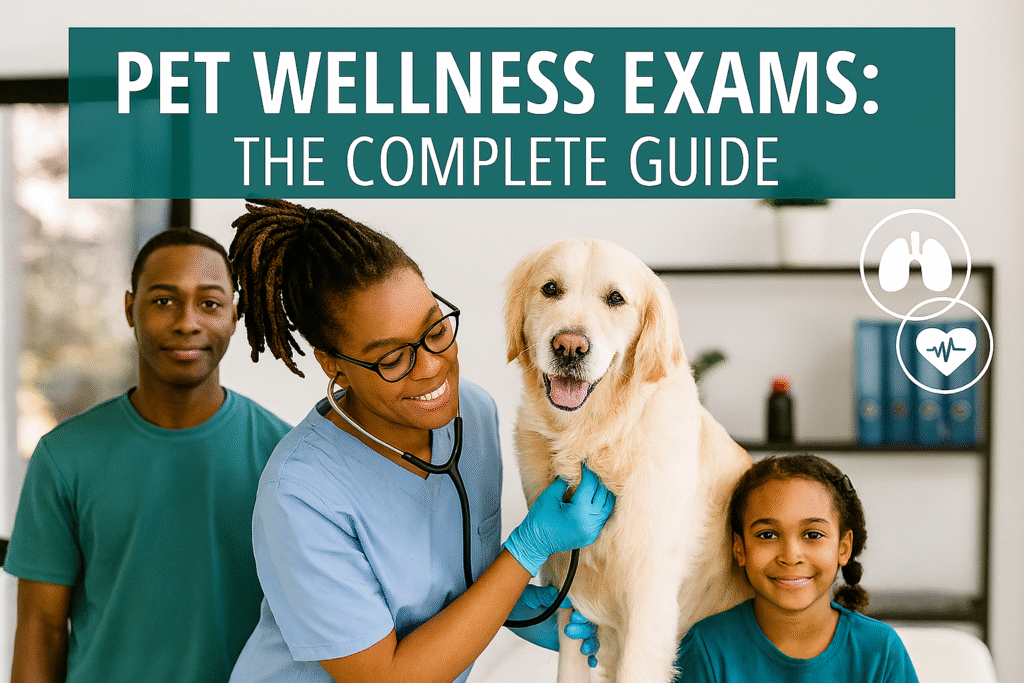Regular pet wellness exams are the foundation of preventive veterinary care. They help detect hidden health issues before they become serious. Vets use these visits to check weight, nutrition, dental health, and overall condition. Vaccinations and parasite prevention are updated during each exam. With consistent wellness exams, your pet enjoys a longer, healthier, and happier life.
What Are Pet Wellness Exams?
A pet wellness exam is a comprehensive health check performed by a veterinarian to evaluate your pet’s overall condition. These visits are the veterinary equivalent of human annual checkups. A typical exam includes:
- Full physical exam (eyes, ears, skin, teeth, joints)
- Listening to heart and lungs
- Weight and body condition scoring
- Review of medical history
- Vaccination updates and parasite prevention
- Nutrition and lifestyle recommendations
- Diagnostic tests such as bloodwork or urinalysis if needed
Why Are Pet Wellness Exams Important?
Early detection is the biggest benefit. Many conditions like heart disease, diabetes, or kidney issues develop silently. Routine exams allow vets to catch problems before they become serious.
According to the American Veterinary Medical Association, pets who receive annual exams live healthier, longer lives due to early intervention and preventive care.
How Often Should You Schedule a Pet Wellness Exam?
- Puppies & Kittens: Every 3–4 weeks until 16–20 weeks old, then annually.
- Adult Pets: Once per year.
- Senior Pets: Every 6 months for closer monitoring.
Your vet may adjust the schedule based on breed, age, and medical history.
What Health Areas Do Exams Cover?

1. Weight & Nutrition
Obesity is a leading cause of arthritis, diabetes, and reduced lifespan. Vets track weight trends and provide diet plans.
2. Vaccinations & Parasite Prevention
Core vaccines (rabies, distemper, parvovirus) and preventives for fleas, ticks, and heartworm are updated.
3. Dental Health
Dental disease affects up to 80% of dogs and cats by age 3. Exams include oral checks and may recommend professional cleaning.
4. Senior Pet Care
Older pets face joint issues, organ decline, and sensory loss. Semi-annual exams help manage these changes early.
What to Expect During a Vet Visit
- Warm greeting and physical exam
- Possible lab tests (blood, urine, fecal)
- Discussion of behavior, diet, and lifestyle
- Personalized care plan for the year ahead
Common Myths About Pet Wellness Exams
- “My pet looks healthy, so no exam is needed.” Pets hide illness well; exams reveal hidden issues.
- “Wellness exams are only for older pets.” Young pets need exams to establish baselines.
- “It’s too stressful for my pet.” Veterinary teams use calm handling, and the benefits outweigh temporary stress.
Cost of Pet Wellness Exams
- Dog wellness exam cost: $50–$150 depending on location and services.
- Cat wellness exam cost: $45–$120.
- Additional costs may include vaccines, lab work, or dental cleaning.
Many clinics offer wellness plans that bundle exams, vaccines, and preventive care at a reduced monthly rate.
Key Takeaways
- Pet wellness exams are vital for preventive care and early detection.
- Annual visits are recommended, with more frequent exams for puppies, kittens, and seniors.
- Exams cover weight, nutrition, vaccines, parasite prevention, dental health, and age-specific care.
- Costs vary but are far less than emergency treatments for preventable conditions.
FAQ
What is a pet wellness exam?
A pet wellness exam is a routine veterinary checkup that evaluates your pet’s overall health. It includes a physical exam, weight check, dental review,updates, and parasite prevention.
How often should pets have wellness exams?
Most adult pets should have one wellness exam per year. Puppies, kittens, and senior pets may need visits every six months.
Why are pet wellness exams important?
Wellness exams allow early detection of hidden health issues such as heart disease, diabetes, or kidney problems. They also ensure your pet stays up to date on vaccines, parasite prevention, and nutrition.
What happens during a pet wellness exam?
A veterinarian will:
- Perform a nose-to-tail physical exam
- Listen to the heart and lungs
- Check eyes, ears, skin, and teeth
- Review diet, lifestyle, and behavior
- Recommend vaccines, parasite control, or lab tests
How much does a pet wellness exam cost?
Dog wellness exam cost: $50–$150 depending on location and services. Cat wellness exam cost: $45–$120. Additional costs may apply for vaccines, bloodwork, or dental cleaning.
Do indoor pets need wellness exams? Yes. Even indoor pets can develop dental disease, obesity, or hidden organ issues. Regular exams help catch problems early and maintain long-term health.
What age-specific care is included?
- Puppies & kittens: Frequent visits for vaccines and growth monitoring.
- Adults: Annual exams for preventive care.
- Seniors: Semi-annual exams with bloodwork to detect age-related conditions.
What myths exist about pet wellness exams?
- “Healthy pets don’t need exams.” → Pets often hide illness.
- “Wellness exams are only for older pets.” → All ages benefit from checkups.
- “It’s too stressful for pets.” → Veterinary teams use calm handling, and the benefits outweigh temporary stress.
Want it tailored to a specific niche like tech, lifestyle, or finance? Just say the word QuickFast!



